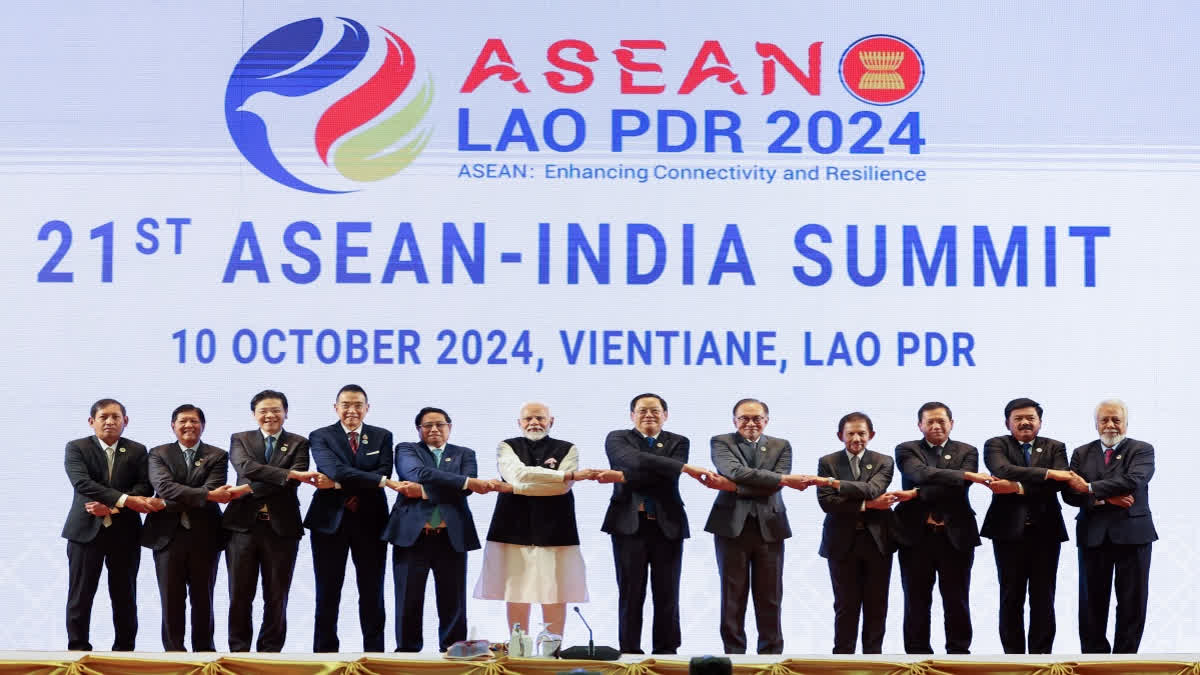New Delhi: Among the documents released following the 21st Association of Southeast Asian Nations (ASEAN)-India Summit held in Vientiane, Laos, on Thursday, is a joint statement on advancing digital transformation.
A major highlight in this statement is strengthening cooperation among ASEAN member states and India in digital public infrastructure.
It recognises the significant role played by DPI "in catalysing digital transformation and promoting inclusivity, efficiency, and innovation in public service delivery; connecting individuals, communities, industries, organisations and countries across geographies, taking into account different domestic and international contexts".
"We acknowledge the opportunities for collaboration, with the mutual consent of ASEAN member states and India, to share knowledge, experiences, and best practices in the development, implementation, and governance of DPI by utilising various kinds of platforms to promote DPI development across the region," the statement reads.
"We recognise potential opportunities for joint initiatives and projects that leverage DPI for regional development and integration. We shall explore collaboration to leverage DPI across sectors in addressing diverse challenges such as education, healthcare, agriculture, and climate action."
In recent years, DPI has emerged as a critical area of collaboration between India and the ASEAN regional bloc, given the transformative power of digital technologies and their role in shaping the future of global economies. This cooperation holds immense importance for various reasons, spanning economic development, regional stability, and technological leadership.
India has been a pioneer in this space with platforms like Aadhaar (digital identity), UPI (Unified Payments Interface), and India Stack, which have transformed access to services for millions. India has made a lot of advances in the last half a dozen years, particularly in using mobile phones, UIDAI and Jandhan accounts that helped people get access to government financial services like banking. A lot of mechanisms are being built to develop the digital economy. The UPI enables the transfer of money at the click of a button.
India is not only innovating the democratisation of e-commerce but is also universalising the ability to buy and sell goods and services online. The Department for Promotion of Industry and Internal Trade (DPIIT) of the Government of India has established Open Network for Digital Commerce (ONDC), a private non-profit company, to develop open e-commerce.
The ONDC is trying to ensure that e-commerce reaches the nooks and corners of the country. It is not an application, an intermediary, or software, but a set of specifications designed to foster open interchange and connections between shoppers, technology platforms, and retailers. ONDC was incorporated with the mission and vision of creating an inclusive ecosystem of e-commerce.
After holding the G20 presidency in 2022-23, India has been pushing for a One Future Alliance (OFA), an initiative that aims to bring together all countries and stakeholders to synergise, shape, architect and design the future of DPI that can be used by all countries.
The alliance will enable countries, especially from low and middle-income brackets, to learn from their experiences in harnessing technology to improve governance, and for social, economic, digital and sustainable development.
Following the G20 Summit held in New Delhi last year, a Global Digital Public Infrastructure Repository (GDPIR) was launched. The European Union and 15 other countries shared their DPIs in the GDPIR. However, apart from Singapore, no other ASEAN member state has shared its DPIs yet.
It is in this context that the statement on strengthening cooperation in DPI between ASEAN and India assumes significance.
Seamless digital infrastructure can facilitate cross-border trade by improving digital payment systems and reducing transaction costs. India and ASEAN, with a combined market of over two billion people, stand to benefit from streamlined financial transactions, fostering greater economic interdependence.
India's expertise in low-cost, scalable digital solutions can support ASEAN nations in building their own DPIs, leading to greater digital inclusion across the region. In return, India can benefit from ASEAN’s experience in creating smart cities and advanced digital platforms in industries like fintech and e-commerce.
India's UPI system has revolutionised digital payments, making them accessible even in rural areas where traditional banking infrastructure is limited. ASEAN countries like Indonesia, the Philippines, and Vietnam can leverage India's payment technologies to create more inclusive economies where individuals and small businesses can participate in the digital marketplace.
India and ASEAN can collaborate to create interoperable payment systems that will facilitate cross-border transactions. This could significantly boost intra-ASEAN trade, tourism, and remittances, enabling seamless financial interactions across the region.
Here mention may be made of the ASEAN Digital Economy Framework Agreement (DEFA) that was launched in September 2023. According to an article published on the website of the S Rajratnam School of International at Nanyang Technological University, Singapore, the DEFA aims to unite ASEAN nations in fostering digital cooperation and adding up to $2 trillion to its digital economy by 2030.
Among the prerequisites, progress in digital payments and e-wallet adoption is needed and notable in some countries such as Thailand, Vietnam, and Malaysia. Yet, infrastructure disparities, varying internet access, and digital readiness in micro, small and medium enterprises pose challenges. Efforts to harmonise definitions, bridge digital gaps, and ensure policy alignment are crucial to unlocking ASEAN’s digital potential.
It is in this context that the ASEAN nations stand to benefit greatly from collaborating with India in building digital public infrastructure. By leveraging India's proven expertise in scalable digital solutions, financial inclusion, cybersecurity, and e-governance, ASEAN nations can accelerate their own digital transformation agendas.
This partnership will not only enhance economic growth and improve public service delivery across Southeast Asia but also strengthen regional cooperation, innovation ecosystems, and strategic autonomy in the rapidly evolving digital world.
